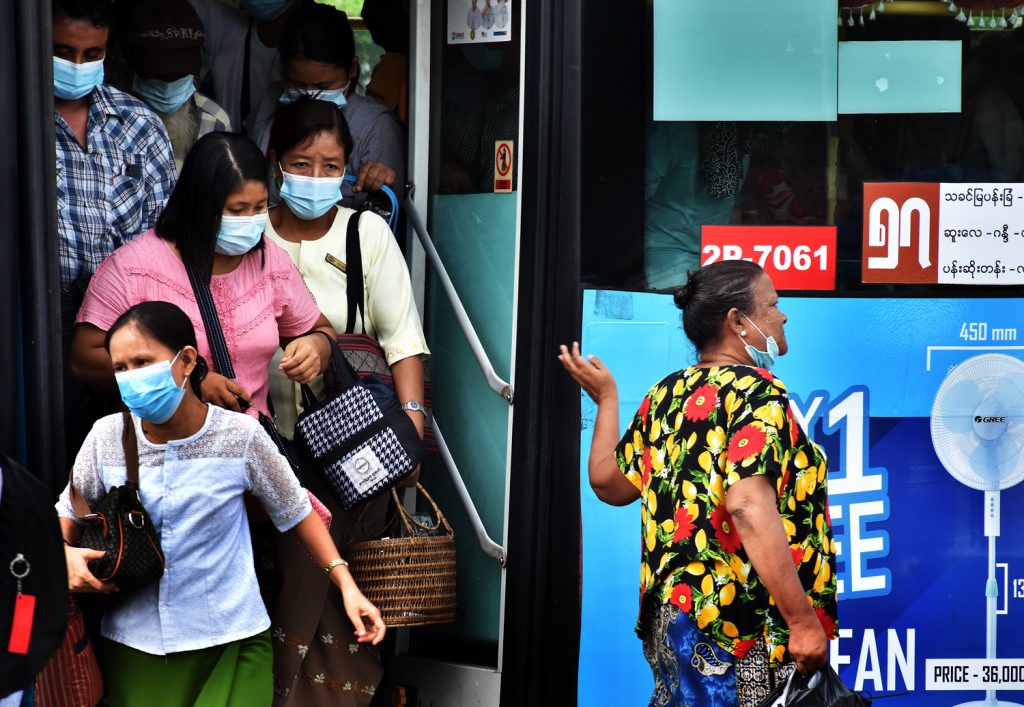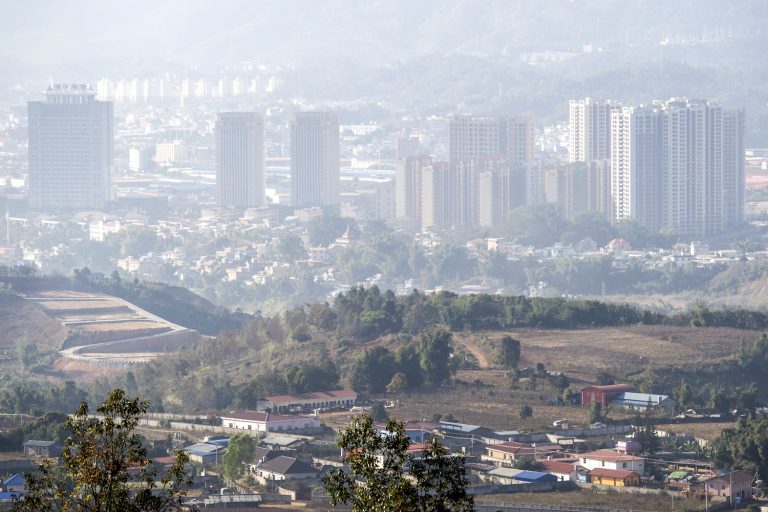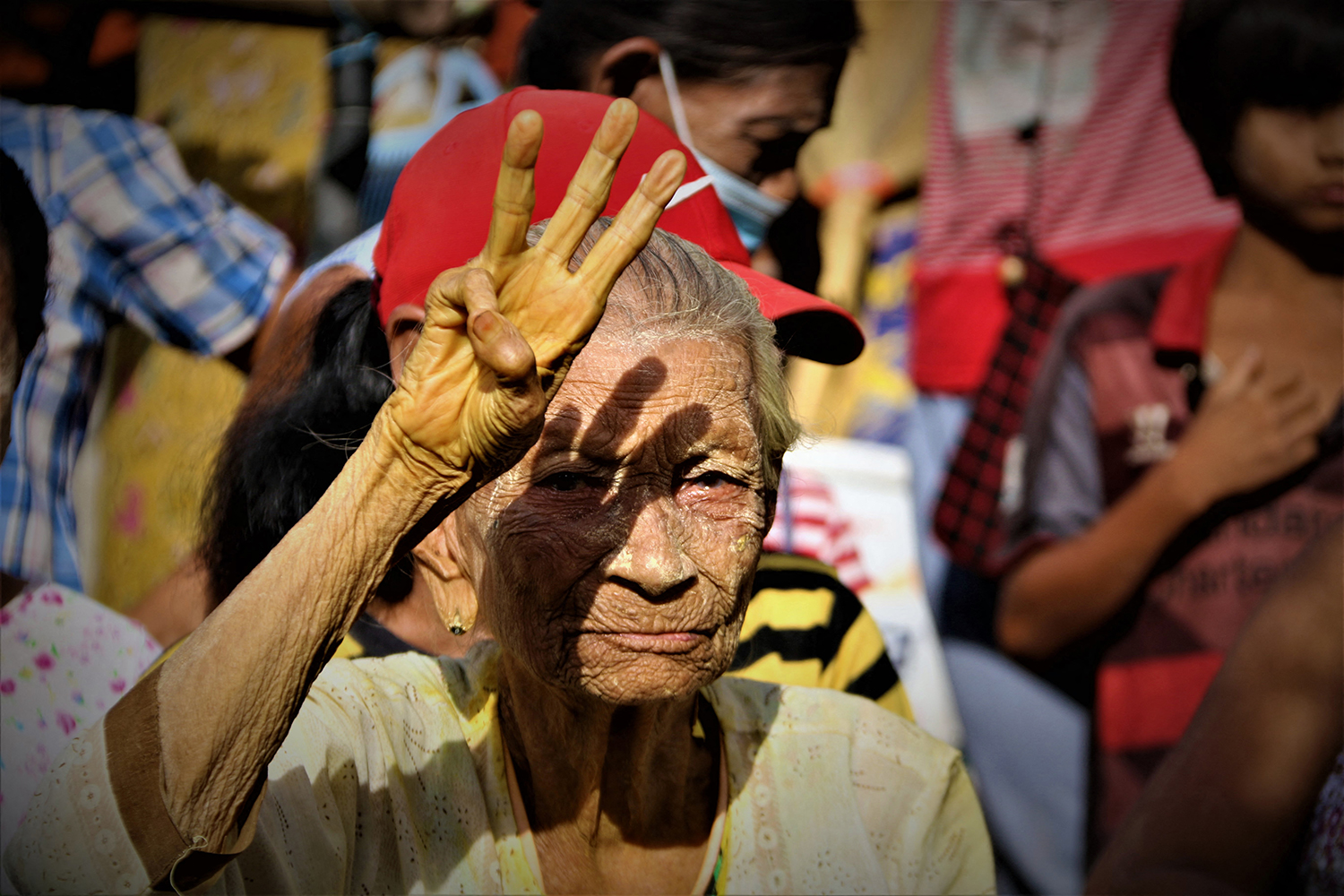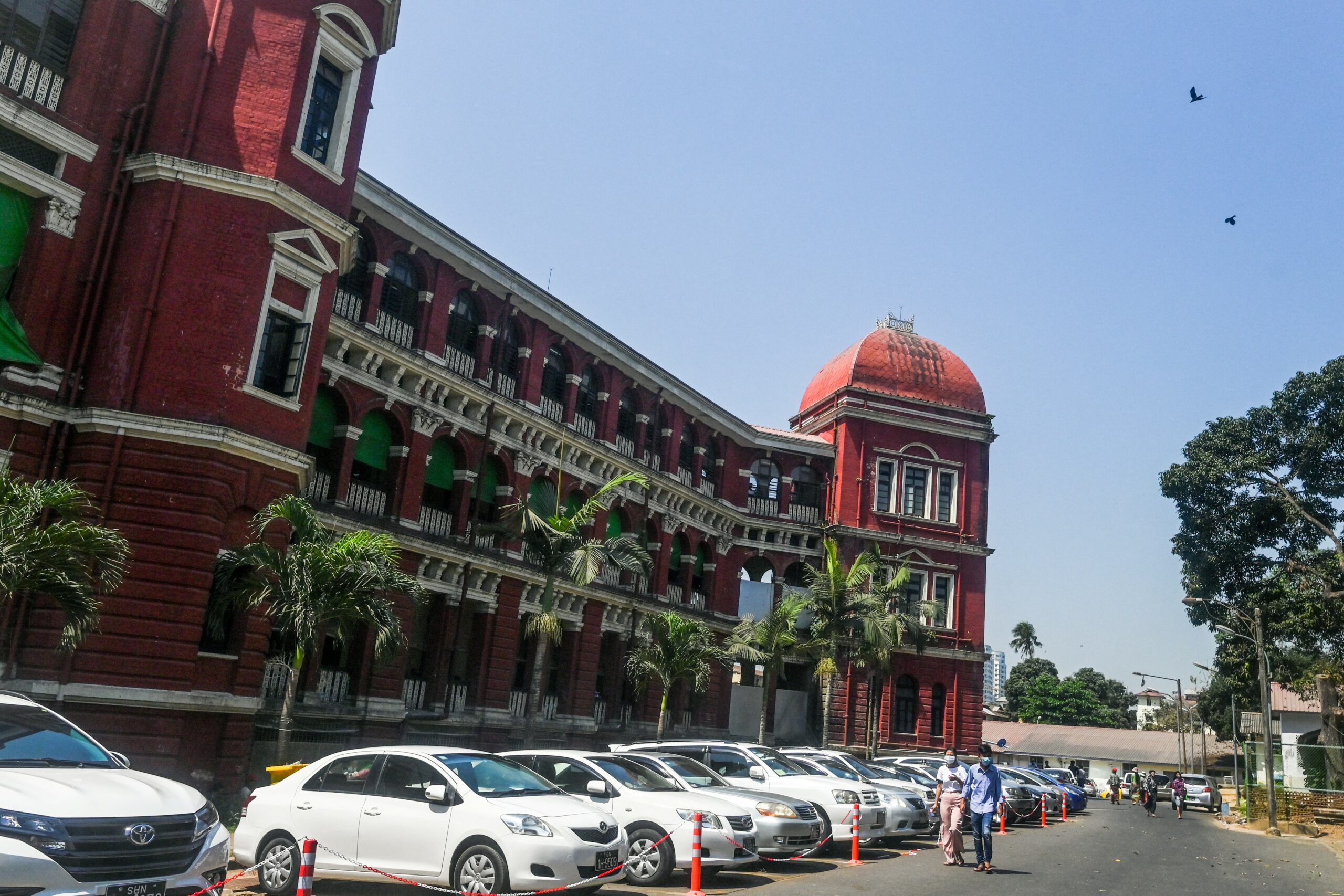The continued threat of a COVID-19 outbreak in Yangon’s dense neighbourhoods makes an urgent case for long overdue fixes to problems of city governance.
By ALEX AUNG KHANT | FRONTIER
When COVID-19 emerged and began spreading across the globe in February and March, Myanmar seemed extremely vulnerable to a major outbreak. Its long, porous border with China, the large numbers of overseas migrant workers who began returning when workplaces shuttered in Thailand and China, and the poor state of its health system, all pointed to a potential calamity.
For now, though, it seems to have escaped the worst of COVID-19. The first two confirmed cases of COVID-19 in Myanmar were not reported until March 23, and almost three months later, the official tally stands at 262 confirmed cases, 175 recovered and six deaths.
While this is very a low toll by international standards, in the absence of widespread testing – only 51,451 tests have been done so far in a country of 54 million people – and further research on the virus, it’s impossible to say that Myanmar will be spared.
In the face of this unforeseen challenge, Myanmar may have been late in responding decisively. The national-level Central Committee on Prevention, Control and Treatment of Coronavirus Disease led by State Counsellor Daw Aung San Suu Kyi was not formed until March 26, 15 days after the World Health Organization declared a COVID-19 pandemic.
By the time Myanmar closed its borders and airports on March 30, many other countries had already introduced strict measures to prevent the spread of COVID-19. The severity of some of these responses has generated public resentment, but nearly six months since the start of the pandemic and with no vaccine in sight, many measures regarded as harsh when they were introduced are now seen as examples of bold leadership and foresight.
In Myanmar’s case, it is important to keep in mind the multitude of long-standing challenges that impede the government’s ability to respond efficiently and to replicate the effective methods seen in other countries.
But while a fair assessment of Myanmar’s COVID-19 response would probably fall somewhere between criticising failures to act and an appreciation of deep structural problems, the continued threat of an outbreak also underlines the need to address governance problems that stand in the way of an effective response.
Some of the most pressing of these problems are readily observable in Yangon, Myanmar’s largest city and home to about 15 percent of its population. Although cases have been detected throughout the country, Yangon is clearly the national epicentre of the outbreak, with 201, or 77pc of all confirmed infections,.
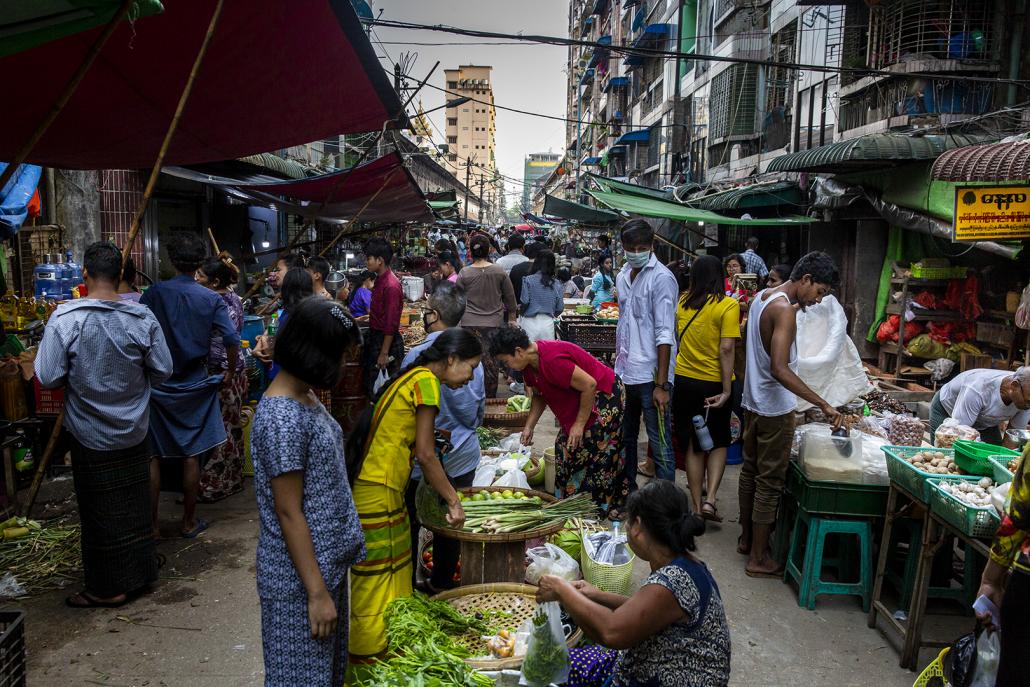
A densely packed wet market on 26th Street in downtown Yangon, seen on March 28, after COVID-19’s presence had been confirmed in Myanmar. (Hkun Lat | Frontier)
Readers who live in cities will be aware of the many ways in which COVID-19 has affected urban life. Throughout the world, metropolitan areas have had much greater difficulty responding to the pandemic because of their population density and role as transport hubs, which brings a much greater risk of infection through close contact. Cities are full of places where people congregate and where social distancing and other precautions need to be rigorously practised and enforced.
Many of these challenges are difficult to avoid or mitigate in any city, but the condition of municipal markets is a legacy of mismanagement by the Yangon City Development Committee, the city’s municipal authority. Designated markets in townships are mostly just compounds protected from rain that have no piped water supply, which makes it difficult to provide hand-washing facilities or support other hygienic practices. Over the years, the YCDC has failed to properly clean, maintain and upgrade these markets, despite the fees imposed on vendors. Moreover, in downtown Yangon there are kerbside wet markets that compete for parking spaces, despite vendors having to pay fees to agents appointed by the YCDC, which offers no facilities in return.
The mismanagement of street markets was vividly captured in footage of clashes on April 21 between vendors and YCDC officers at 38th Street in Kyauktada Township, which was streamed by onlookers on Facebook. By executive order of Yangon mayor U Maung Maung Soe, the vendors were forcibly evicted from Kyauktada to neighbouring Botahtaung Township, just days before Botahtaung was placed under a community quarantine for more than two weeks because of the relatively high number of cases in the township. The vendors were not allowed to return to Kyauktada despite the quarantine order in Botahtaung, and Kyauktada residents who relied on the market had little choice but to travel to a supposedly locked-down township to buy essentials. This sparked fiery criticism from Pyithu Hluttaw MP Daw May Soe (National League for Democracy, Botahtaung), resulting in her dismissal from the NLD.
Many vendors who are accustomed to unsanitary conditions have no prior habit of wearing gloves or masks, which have been mandated by city authorities with the threat of being dragged to court and fined K5,000. Besides, having to wear a face mask and gloves for many hours in the heat is a nuisance and an extra financial burden at a time of dwindling sales at markets. Rather than putting the onus on vendors in this way, city authorities should urgently upgrade infrastructure at markets to make them more hygienic for everyone.
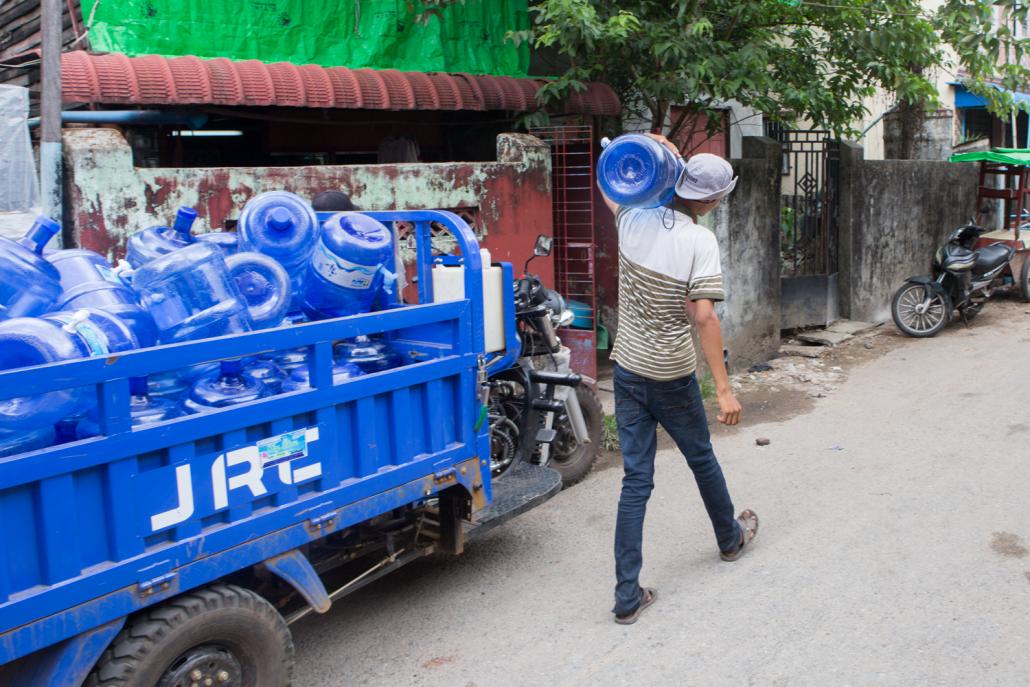
Small armies of workers deliver drinking water to homes and businesses each day, making them prime candidates for catching and spreading COVID-19. (Thuya Zaw | Frontier)
The supply of drinking water also raises concerns. Because of the lack of a safe, clean public supply, hundreds of private water companies each employ a small army of workers to deliver drinking water to homes and businesses each day, by pushcart or truck, in 20-litre plastic barrels that are often inadequately cleaned before reuse. The conditions for these essential workers make them prime candidates for catching and spreading COVID-19.
While working on the long-term solution of providing clean piped water, the YCDC could play an important role in overseeing the private water companies, for example by ensuring that companies provide their workers with protective gear and regularly check their temperatures, as part of a plan to improve the conditions of this overlooked group of workers who provide an essential service.
Most workers who provide essential services come from the outer suburbs and rely on affordable public transport to get to work. An overwhelming 85pc of Yangon’s population depends on buses, and the Yangon Bus Service, a public-private partnership, ran about 4,500 buses daily before the pandemic. YBS announced it would run a limited service of 1,000 buses a day during the Thingyan holiday in mid-April, but far fewer actually ran and some lines were stopped altogether. YBS’s private shareholders said this was necessary because of a drop in passenger revenue. The Yangon Region Transport Authority, which oversees YBS, said on May 27 that the service had returned to 70pc capacity. The following week, YBS said normal service may not resume until July.
This reduction in service has hurt members of the working class the most. Essential services like transport are needed more than ever at times of crisis. The naked motive behind the service reduction – to save money for shareholders – seemed to show how the partly privatised structure of the YBS prevented it from fulfilling its mission to provide the people of Yangon with an essential public good. Fewer buses and fewer active routes have also meant more crowded commutes, which increase the risk of infection.
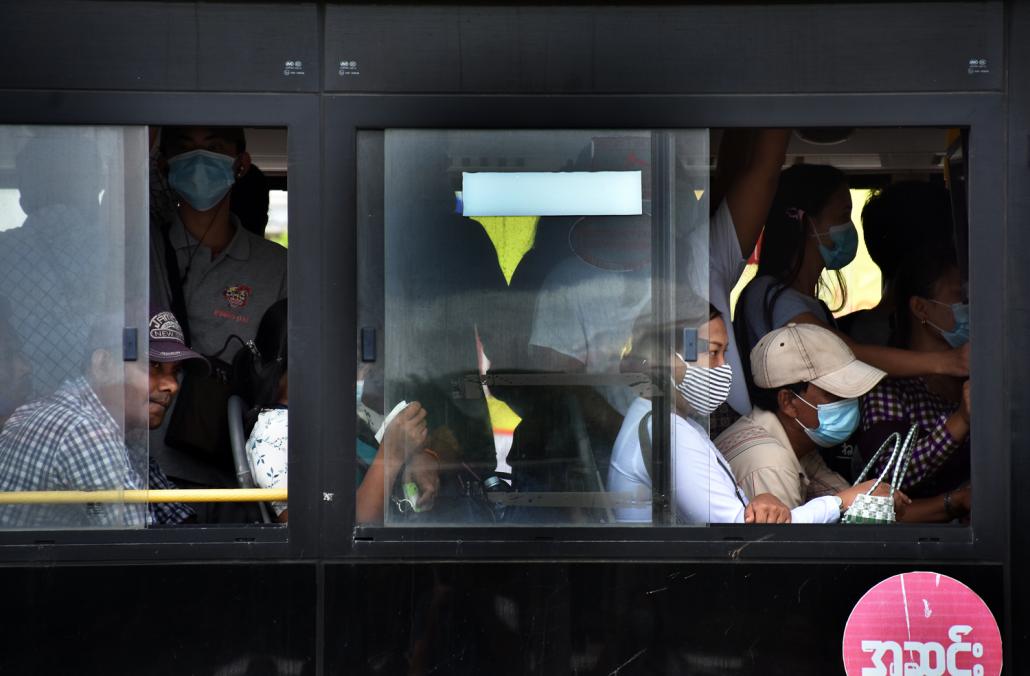
A crowded bus leaves from Maha Bandoola Garden in central Yangon on June 15. Fewer buses and fewer active routes have meant more crowded commutes, which increase the risk of infection. (Steve Tickner | Frontier)
It was inevitable that the pandemic would batter economies and force the closure of many businesses. Few, if any, countries were prepared for a crisis of such magnitude. However, in the absence of adequate preparation, the next best solution can be found in drastic adaption using existing technology. On a national level, this means retrofitting factories to produce critical materials and finding ways of recovering perishable trade products that can no longer be exported due to trade restrictions. The latter measure could include processing food for storage and distributing it at a time of greater demand. Small businesses that are helping to tackle COVID-19 – such as tailors producing reusable face masks, plumbers installing hand-washing stations and chemical companies making hand sanitisers – could also be given incentives or subsidies.
The resilience of the Myanmar people and an active civil society has manifested in spontaneous donor-led campaigns to make and distribute washable face masks and install public hand-washing stations. Yet the companies that have been paid with donor money to provide these goods in bulk have largely been well-established businesses that were better able to withstand the crisis. Spreading the donated money more widely, with smaller orders from a range of smaller companies, would have created the added benefit of helping small business owners.
Food donations provided via the kitchens of well-known restaurants are a case in point. Insufficient donor funds were channelled to small restaurants and neighbourhood teashops, which were classified as non-essential businesses and banned from hosting dine-in customers since the end of March, prompting many of them to close. Matching these businesses to delivery services and donor groups would have helped to distribute money more equitably and provide crucial support to the hospitality industry, whose workforce is often drawn from poorer communities and includes many young women.
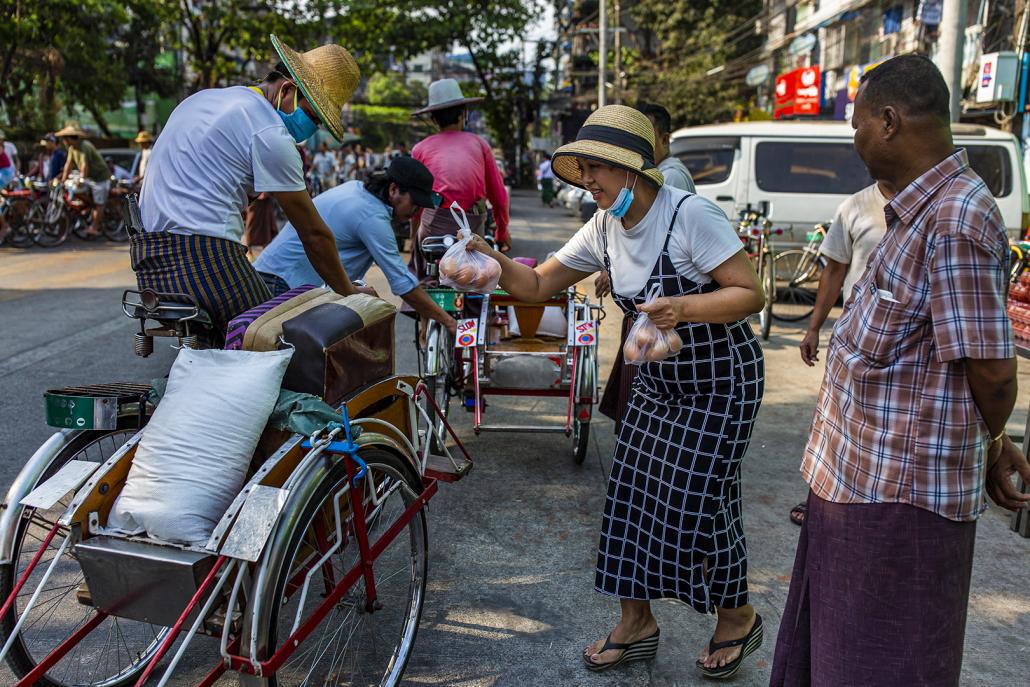
Charity group People to People donates eggs to underemployed trishaw drivers in Sanchaung Township on April 9. (Hkun Lat | Frontier)
Beyond help for struggling businesses, support for families deprived of income could be smarter and more comprehensive. The need is considerable: A survey of Yangon’s informal settlements published in May by UN-Habitat found that in the course of a month, 69pc of households had taken out a loan, of which 88pc was used to buy food.
Although the government distributed basic food items during Thingyan for those lacking a regular salary, essential workers such as YBS drivers were left out despite having their work hours cut because of a more limited bus service. Establishing community kitchens at monasteries and teashops, and employing jobless cooks, would do more to alleviate hunger among the urban poor.
The government’s decision to waive up to 150 units in household electricity tariffs for April was largely welcomed, but long queues to pay bills were observed outside offices of the Yangon Electricity Supply Corporation, which undermined social distancing measures imposed in other areas of life. A campaign to promote existing mobile payment options by city authorities could have prevented these unnecessary crowds. Myanmar may not have the capacity to develop high-tech solutions like in South Korea, but its high mobile penetration can be harnessed to circumvent challenges to an effective COVID-19 response in urban areas.
These suggestions might not seem important, but they all aim to tackle problems faced by less well-off households. Not all of us are aware of these challenges. As the South Korean film Parasite, which earlier this year made history by becoming the first foreign movie to win an Academy Award for best picture, showed, the squalid reality of life for the urban poor can easily be missed by people sharing the same society.
When Yangon shut down in early April, residents of gated communities or luxury developments such as Star City and Pun Hlaing Estate uploaded videos of themselves enjoying walks in their lush, green surrounds. I am sure readers will not find it difficult to imagine a different reality for those who live in crowded informal settlements or apartments, and may have lost their jobs because of the pandemic.
As State Counsellor Daw Aung San Suu Kyi said on April 10, “The resiliency of a country can be measured in terms of its ability to take care of its weakest people.” In any crisis, the poor are the most vulnerable, but there is considerable opportunity for city authorities to influence how much, or how little, COVID-19 will affect them.
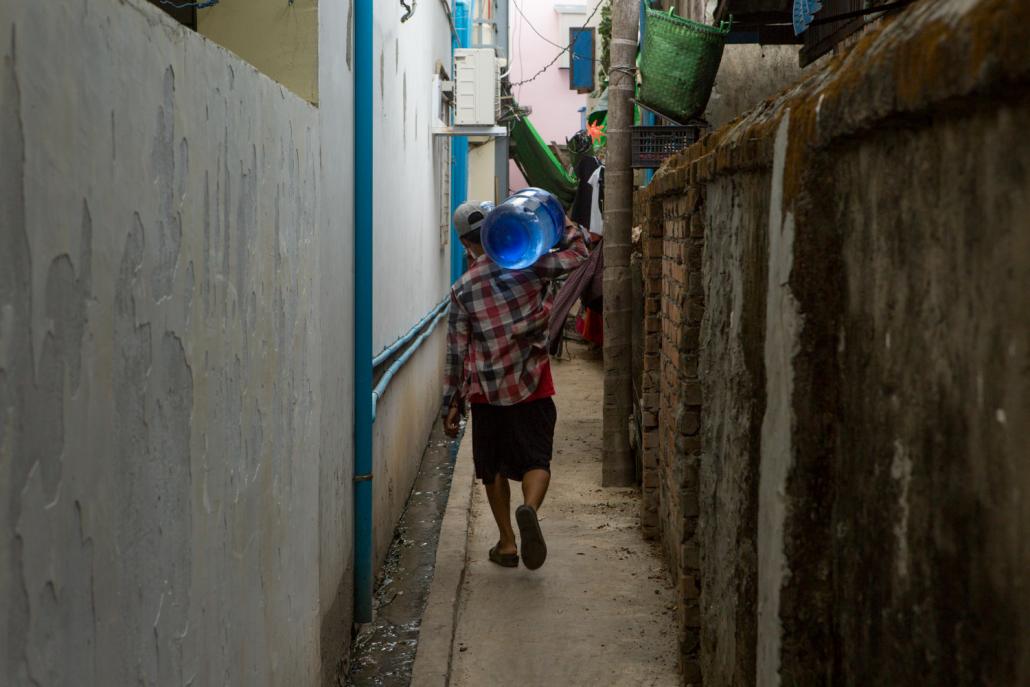
The 20-litre plastic barrels of drinking water delivered daily to homes and business are often inadequately cleaned before reuse. (Thuya Zaw | Frontier)


